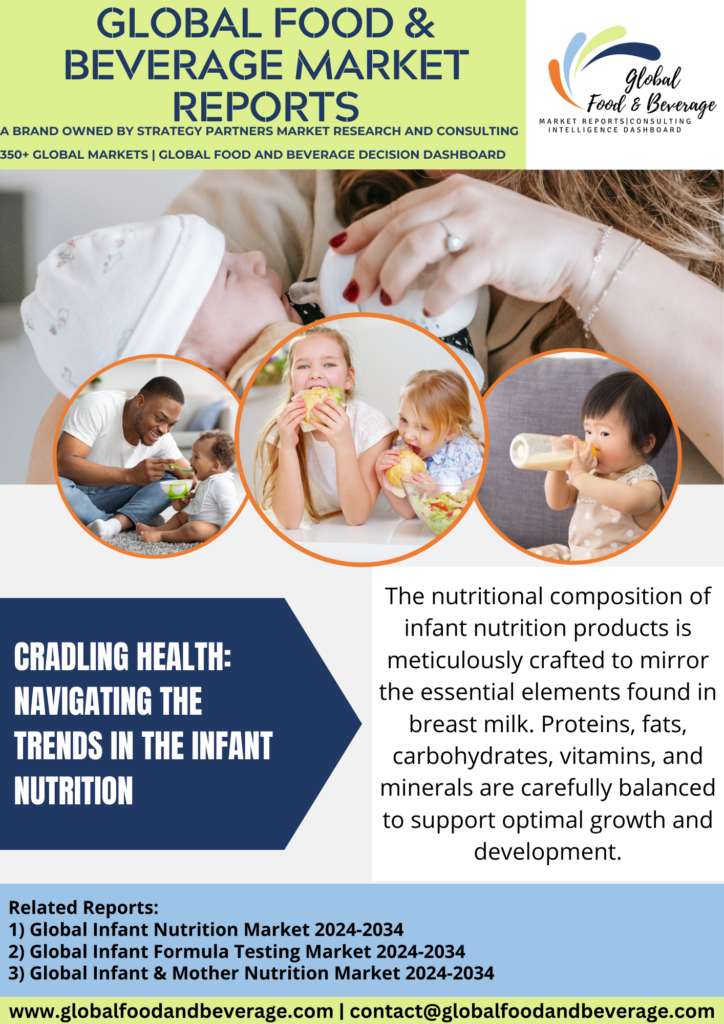Cradling Health: Navigating the Trends in the Infant Nutrition Market
Infant nutrition is a critical aspect of early childhood development, laying the foundation for a child’s growth, cognitive function, and overall health. During the first year of life, a baby’s nutritional needs are particularly high, and the choice between breastfeeding and formula feeding plays a significant role in meeting these requirements.

Breast milk, often considered the gold standard for infant nutrition, provides a perfect balance of essential nutrients, antibodies, and enzymes. It not only meets the baby’s nutritional needs but also offers protection against infections and diseases, promoting optimal growth and immune system development. The World Health Organization (WHO) recommends exclusive breastfeeding for the first six months of life, followed by the introduction of complementary foods while continuing breastfeeding for up to two years or beyond.
For mothers who cannot breastfeed or choose not to, infant formulas are designed to provide a substitute that closely mimics the nutritional composition of breast milk. These formulas are fortified with vitamins, minerals, and other nutrients essential for a baby’s growth. The choice between breastfeeding and formula feeding is a personal one and depends on various factors, including maternal health, lifestyle, and infant needs.
As infants grow and transition to solid foods, introducing a variety of nutrient-rich foods becomes crucial. This stage, typically starting around six months, involves offering pureed or mashed fruits, vegetables, cereals, and proteins. Gradual introduction of different food groups helps develop the baby’s palate and ensures a diverse and balanced diet.
Key nutrients for infant nutrition include iron, zinc, calcium, vitamin D, and omega-3 fatty acids. These nutrients are vital for brain development, bone health, and overall growth. Pediatricians play a crucial role in guiding parents on appropriate feeding practices, addressing concerns, and monitoring the infant’s growth and development.
ADVANCEMENTS
Infant nutrition have focused on optimizing the health and development of infants through innovative formulations and personalized approaches. One significant breakthrough is the development of human milk-based fortifiers for preterm infants. These fortifiers, derived from donor breast milk, provide a more natural and biologically relevant source of nutrients, supporting the unique nutritional needs of premature infants.
Advancements in the inclusion of bioactive compounds in infant formulas contribute to enhanced immune support and cognitive development. Ingredients such as human milk oligosaccharides (HMOs), prebiotics, and probiotics are added to mimic the benefits of breast milk, promoting a healthy gut microbiome and overall immune resilience.
The exploration of personalized nutrition for infants involves tailoring formulas based on individual characteristics, such as genetics and metabolic profiles. This approach recognizes that each infant has unique nutritional requirements, allowing for more targeted and customized nutritional interventions.
The development of sustainable and plant-based infant nutrition options addresses environmental concerns and evolving dietary preferences. Plant-based proteins, such as those derived from soy or pea sources, are incorporated into formulations to offer alternatives for families seeking plant-centric nutrition for their infants.
Advancements in packaging technology contribute to improved preservation of the nutritional quality of infant formulas. Aseptic packaging and protective layers help minimize exposure to light, air, and contaminants, ensuring the stability of sensitive nutrients and reducing the need for added preservatives.
Digital health tools, including mobile applications and online platforms, provide parents with valuable information and support for infant feeding. These tools offer guidance on breastfeeding, formula feeding, introduction of solid foods, and tracking developmental milestones, promoting informed and personalized care for infants.
CHALLENGES
Infant nutrition faces a myriad of challenges encompassing maternal health, breastfeeding, complementary feeding, market dynamics, regulatory compliance, and cultural practices. One significant challenge is promoting proper maternal nutrition during pregnancy. Inadequate access to essential nutrients for expectant mothers can impact fetal development and maternal health. Improving access to balanced diets and nutritional education for pregnant women is crucial to address this challenge.
Encouraging and supporting breastfeeding practices encounter challenges, including workplace support, societal norms, and maternal health concerns. Overcoming cultural barriers and ensuring lactation support in workplaces are essential for promoting breastfeeding as the optimal source of infant nutrition.
Introducing complementary foods to infants poses challenges related to the quality and diversity of diets. Addressing issues such as food safety, appropriate feeding practices, and affordable access to nutrient-rich foods is crucial to ensure proper infant nutrition during the weaning period.
Market competition in the infant nutrition industry is intense, with various formula products available. Successfully differentiating products, addressing diverse nutritional needs, and staying competitive require continuous innovation in formulations, packaging, and marketing strategies.
Regulatory compliance is a complex challenge in infant nutrition, especially concerning health claims, labeling requirements, and safety standards. Adhering to diverse regulations across regions or countries requires continuous diligence to ensure transparency and compliance with global standards.
Cultural practices and beliefs related to infant feeding present challenges. Tailoring nutrition education to align with cultural norms and values is essential for promoting optimal infant nutrition and bridging gaps in understanding.
CONCLUSION
Infant nutrition emerges as a cornerstone of lifelong health, shaping the foundation for physical and cognitive development. From breastfeeding to meticulously formulated infant formulas, the industry plays a pivotal role in providing essential nutrients during the critical early stages. As global awareness of the significance of early nutrition deepens, innovations in personalized formulas and sustainable sourcing promise a future where every infant receives optimal nourishment. The commitment to scientific research, stringent safety standards, and maternal education fosters a landscape where infant nutrition not only meets nutritional needs but contributes to a resilient and thriving global generation, ensuring a healthy start for the world’s youngest members.
